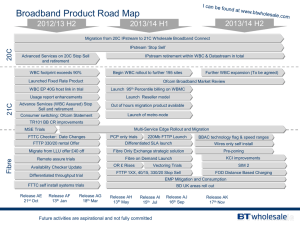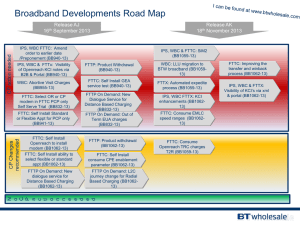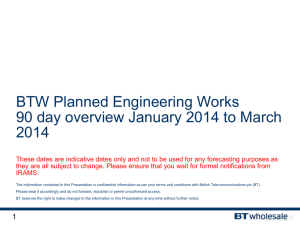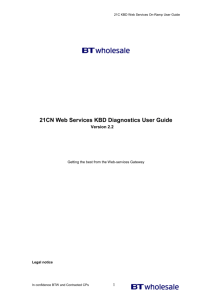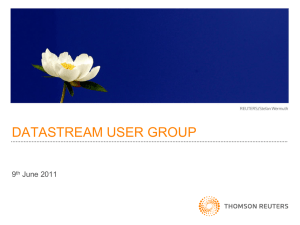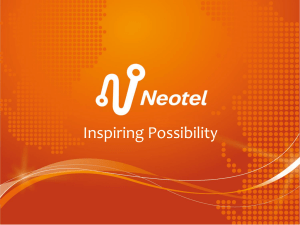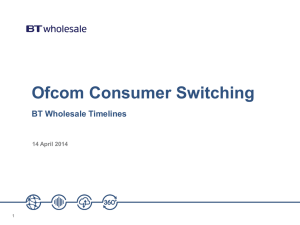ISP Forum 4th October 2012 break out session slides
advertisement
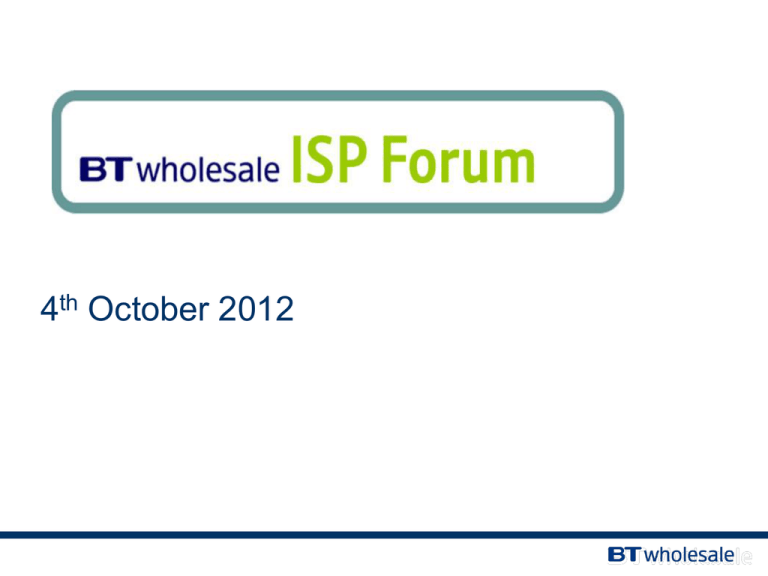
4th October 2012 Breakout session – Auditorium Session 1: KBD Overhaul Self-serve KBD OVERHAUL & SELF SERVE ISP FORUM – OCTOBER 2012 James Lamb KBD and Test & Diagnostics Manager BT Wholesale, Service Operations, T2R KBD OVERHAUL James Lamb KBD and Test & Diagnostics Manager BT Wholesale, Service Operations, T2R KBD … feedback from Customers • Current diagnostic time averages 6 mins. Takes Too Long! No Non-Interactive Option Inefficient No Non-Intrusive Option • Customers want to hit a button and get a diagnostic result. They don’t want to answer many questions. • Some tests currently performed serially. • Some tests are executed when not necessary. • There is no option to do non-intrusive testing on a line first. Hence Customer needs to spend time calling end-users on alternate numbers when testing the line. Too Many Outcome Codes • Hundreds of KBD outcome codes. • Simplified/rationalised/tightened up. Diagnostic Accuracy • Must be above 90% • Consistent fault baseline. From CustomerFeedback ServicEdge Review 14/03/12 THE PROPOSAL Existing KBD Simplified KBD A number of structured questions adding to test execution time Non-interactive model during test execution. Fewer questions asked upfront . Large number of outcome codes (220) Lesser number of outcome codes (90) across WBC Copper, FTTC and FTTP Large number of workflows (38) Reduced number of workflows (13) Outcome codes follow Test specific notation Outcome codes categorized in domains like Home, Network, Access, No Fault, Further Diagnostics which aligns outcome codes with localized domains Complex and Heavy Light weight and simpler Copper Line Test called in 29 places in Copper Line Test called in only 3 workflow places in workflow Uncommitted New KBD Plan-on-a-Page Q2/1213 July Aug Q3/1213 Sept Rel AD Concept Rel AF Designs Oct Nov Rel AE Rel AG Designs Q4/1213 Dec Jan Feb Socialise concepts with Customers and Suppliers Capture feedback to improve concept designs Mar Rel AF April Rel AG Rel AH Designs Scope = WBC & NGA Socialise concepts within BTW Q1/1314 New KBD Standalone Tool (not integrated with T2R journey) KBD Test History Retrieval Simplification May Rel AH CC-SFI standalone Functionality Customer Migration to New KBD New KBD integration with Portal Journey Replace OSC New KBD integration with XML / Sentry / B2B journey T2R / L2C journey improvements KBD fine-tuning – iteration 2 KBD fine-tuning – iteration 1 Trial 1 Controlled trials to test KBD Logic with BTW & Customers Co-Lo approach, Feedback and Continuous Fixes Delivery dates are NOT confirmed. ServicEdge Review 14/03/12 June Trial 2 Controlled trials to test KBD Logic with BTW & Customers Trial Customer migration & in-life experience Co-Lo approach, Feedback and Continuous Fixes THE BENEFITS Diagnostic Cycle Time • 20 to 40% diagnostic cycle time reduction for Customers • People/Resource Savings Engineering Visit Reduction • Reduction in CCSFI i.e. truck rolls by disassociating the CCSFI process from KBD. Cost Reduction Customer Experience Diagnostic Accuracy • Simpler Cleaner Interface - Rationalised systems and flows 20/21C • Faster future development enabled through new clean code/logic base. • Rationalised KBD outcome codes (Localised). • Non-interactive/Slicker • GUI Simplification/Enhancement • Aim to maintain accuracy through programme • Aspiration to increase based upon new KBD diagnostic baseline ANY QUESTIONS? If you would like additional Information or have any further questions, contact; James Lamb KBD and Test & Diagnostics Manager BT Wholesale, Service Operations, T2R Telephone: 07713 265365 Email: james.f.lamb@bt.com SELF SERVE James Lamb KBD and Test & Diagnostics Manager BT Wholesale, Service Operations, T2R Capability Self Serve Benefits Hot VP/VLANS (Cu) DLM - direct access to affect profiles (Cu) BRAS Profile Mismatch (Cu) TAM Test (Cu) 'TAM Test' (Fibre) TRDB (Test Retrieval Database) RRT-1 - Self Serve Cu & Fibre Radius Logs (IP Connectivity) Port flex/reset - standalone Cu & Fibre Common fault (e.g. EMU) KBD super-lite 1. Reduction in time, information available to Customers 2. Reducing the need for Customer contacts into BTW 1. Customer control of EU DSL profile to either optimise performance or stabilise service in a fault scenario. 2. Accommodates Customer own CPE/chipset given that the product is 'wires-only' 1. Allows Customers to throttle downstream speed to align with the Sync Speed of the EUs router. 2. Reduce First or Second cycle faults by managing throttling without having to report a fault into BTW 1. Customers will have the capability to test the network and confirm whether the End User is configured correctly where an IP connection issue is being experienced. 2. Allow Customers to confirm the DSL, ATM, PPP and IP layers are functional between these points including QoS tests. 1. Discussion required with Supplier - Openreach 2. SoR 1. TRDB will assist Customers in normal first cycle or repeat type faults. 2. The database will provide records of test results to assist in repeat type faults 1. Customers able to do meaningful and accurate diagnostics for EU Home and Access domain issues. 2. RRT data over 28days with near real time data will provide greater confidence to progress CCSFI or Boost orders for Openreach investigation 3. Offers Customers greater control and confidence to manage Home related problems with EUs 1. Customers can view data longer then 24Hrs (up to 48Hrs) 2. Including whether any IP (Internet Protocol) session connectivity has occurred or ‘Worked’ (not currently connected) or ‘Working’ and how long that working session has been established. 3. The IP Connectivity Log data, however will be 10-15 minutes behind so is close to real time. 4. Show any attempts to connect, short sessions (potential intermittent IP connection issue) etc. 1. Reduction in cycle time – queried time to resolve. Following TOR how quickly is this passed back to CP when successful? Provide Customers with greater visibility of BTW's EMU notifications 1. Quick and easy standalone check to confirm any account, network or connectivity issues that may be impacting the ADSL Broadband or FTTx Broadband service. 2. Substitute for the standalone IP and Status Checks 3. Faster and more accurate identification of connectivity issues. 4. Optimises test performance by using logic to determine what checks are required and will run tests in parallel where applicable. Batch Testing - Post outage Access to near real-time performance data Cu & Fibre Performance Test Result CCSNR Cu & Fibre Fault & Order Tracker Dashboard (Jeopardy Management) KCI overhaul on journeys 1. Results available in TRDB 2. Visibility in other Tools. 1. Available in near Real time ANY QUESTIONS? If you would like additional Information or have any further questions, contact; James Lamb KBD and Test & Diagnostics Manager BT Wholesale, Service Operations, T2R Telephone: 07713 265365 Email: james.f.lamb@bt.com Breakout session – Maple Suites Session 2: Broadband retirements – alternative products surgery ISP Forum- Product Matrix Workshop October 2012 TIMESCALES Date 30th June 2011 July 2011 By 31st Dec 2011 Datastream Datastream retirement notification issued Began CPs’ requirements capture First exchange-based stop sell sixmonth notification issued No further supply of new EU access or new VPs - nationally By 1st November 2012 By 30th June 2013 First exchange-based stop sell begins as notified Datastream retired within WBC footprint By 31st October 2013 31st March 2014 Began CPs’ requirements capture No further supply of new CALs and – ATM Access ports nationally By 1st May 2012 June 30th 2012 IPstream & IPstream Connect End User Access Datastream & Datastream SDSL retired nationally First exchange-based retirement of service begins as notified Retired within WBC footprint NOTIFICATION TIMELINE & PROCESS Nov 12 6 Months Oct 13 Stop Sell 12 Months Stop Sell Notification Product Closure Nov 12 May 12 6 Months Nov 13 Stop Sell 12 Months Stop Sell Notification Product Closure Phases 3 & 4 Sep 12 Phase 6 Exchanges Phase 2 - 425 Exchanges Phase 1 - 425 Exchanges May12 Mar 14 Oct13 13 Months Stop Sell Notification Stop Sell 5 Months Product Closure Product Replacement Current Product Datastream 1:1 contention within WBC footprint Proposed Solution Commercial Benefit WBC with Real Time QoS Datastream – c.£122 for 1Mbit/s user WBC – c.£66 for 1Mbit/s dedicated RTQoS user incl WBMC shared costs Comments Guaranteed delivery through the network via packet marking Datastream in final IPstream Fixed Rate 10% footprint Ipstream is utilised for VoIP calls currently EFM Bonded services (multiple n x cost of single WBC service (n x £5.88 plus Multi-link PPP on WBC WBMC bandwidth and EU costs) Datastream lines combined to create WBC – c.£66 for 1Mbit/s dedicated RTQoS user Single WBC with RTQoS a faster access inc WBMC shared costs service) Fibre WBC FTTC 40/10 product is £14 pm rental Datastream – c.£175 p.m. for 1Mbit/s user, VP, CAL WBC with Annex M WBC – c.£73 for 1Mbit/s dedicated RTQoS with Annex M (includes WBMC BW and EU costs) SDSL Would require WLR (~£10 p.m.) and new CPE EFM Fibre WBC FTTC 40/10 product is £14 pm rental Fixed Rate No additional charge – Standard £5.88 & £48.55 Datastream/ WBC Fixed Rate per Mb Ipstream Datastream/ WBC £5.88 & £48.55 per Mb Ipstream Max All options increase potential speed of broadband ML-PPP option may require enhanced CPE and special LNS config ServicEdge Review 14/03/12 Provide increased upstream speed in those available exchanges Trials in Q3 aiming for Q4 launch BAU Real-Time QoS – Summary of Features Benefits Features Network Performance Availability Key Considerations • Allows important time/quality critical traffic to be prioritised • Minimises packet loss, jitter and delay • Enables customers to provide assurances against applications like VoIP and Video Conferencing • Utilises the industry standard ‘Expedited Forwarding’ (EF) DSCP marking • ‘Traffic is strictly prioritised in the downstream direction within the WBC network • WBC network congestion is heavily asymmetric in the SVLANs, thus upstream is not congested and does not require strict prioritisation • BT Wholesale monitor network performance using independent third party robots (Epitiro). Packet Loss no greater than 0.1% • Round Trip Delay (latency) no greater than 30milliseconds • Jitter no greater than 15milliseconds • Available on WBC ADSL2+, FTTC and FTTP • £3.50 for 1Mb per end (at launch) user plus £53.55 per Mb contracted bandwidth (WBMC Shared) • Recommended ADSL Annex M is consumed to optimise upstream bandwidth • Recommend Super Stable or Custom Dynamic Line Management profiles are used • CPs need to ensure their End User’s CPE supports Real Time prioritisation in both upstream and downstream directions. Dynamic Line Management (DLM) ADSL1 ADSL2+ Benefits Upstream problems managed through downstream DLM changes Separate upstream and downstream DLM changes No loss in downstream speeds for upstream problems Limited set of profiles available Increased set of profiles both fully rate adaptive and banded Allows DLM to better manage more severe line issues Limited level of interleaving available Multiple interleaving levels and much higher protection Improved impulse noise performance Interleaving cannot be removed by DLM when noise improves Where “Auto” is selected & interleaving is applied, can be auto-removed if noise improves Improved rates when interleaving not required Limited control over DLM More custom control over DLM Allows customer to tune DLM for specific service Slow to react to problems and improvement (2 days and 14 days) Faster to react to problems and improvements (2 days) More reactive to changes of line conditions ServicEdge Review 14/03/12 Annex M– Summary of Features • Optional feature of standard WBC end user lines • Permits higher upstream rates Benefits • Extends theoritical upstream speed to 2.5Mb • 1Mb on Annex A Features • Network Performance Availability Key Considerations This is achieved by allocating a small part of the bandwidth that would normally be used for the downstream channel to the upstream • Results in a slight decrease in downstream rate • Available on WBC ADSL2 • £7 per end user per month • Can be used in conjunction with Real Time QoS • Annex M can only be used on loops which are 38dB or shorter in length • Due to regulatory restrictions Back-Up How RTQoS Works WBC Network Prioritisation: 1. Real-Time QoS marked traffic (‘Expedite Forwarding’ – Industry standard DSCP mark EF) arriving from the CP’s network in the downstream direction will take priority at the Aggregation Point over all other traffic as it flows to the BRAS. 2. Traffic marked as real-time will have first access to the SVLAN during the queuing process, with the BRAS ensuring that all RTQoS queues are emptied before the best-efforts class is served. 3. Each SVLAN will have a maximum RTQoS partition. This partition will ensure that bandwidth is reserved for real-time traffic when required. 4. Traffic that exceeds RTQoS Contracted Bandwidth at the AP will be treated as RTQoS Burst Bandwidth. Customers are responsible for determining the level of traffic being prioritised and appropriate capacity. 5. Traffic that exceeds the End User Contracted Bandwidth will be discarded. RTQoS – Host Link/AP Bandwidth Utilisation Benefits Network without RTQoS • CPs wanting to ensure all of their End Users critical data is transmitted during the busiest periods would have to purchase significantly more bandwidth in-order to provide generous planning rules against peak utilisations. Network with RTQoS enabled • CPs can ensure that during the busiest periods their end users critical data is prioritised and transmitted without delay or loss. • CPs would not need to provide generous planning rules to protect business data, thus reducing the overall best efforts bandwidth required. RTQoS Components Components Ordered Separately • End User access bandwidth • Contracted bandwidth at the WBC Aggregation Point / WBMC Host Link WBC Aggregation Point/ WBMC Host Link Best Efforts Subscription b/w Router xDSL Line BTW Core Total b/w Real Time Subscription b/w XML, Portal End User Access Options 220 kbps 350 kbps 700 kbps 1000 kbps 1300 kbps … 4900 kbps Variety of options to support different codecs and multiple lines XML, Portal on WBC Bandwidth Subscriptions 1Mbps 2 Mbps 3 Mbps … 500 Mbps Subscriptions are additional to the BE existing subscription RTQoS Pricing WBC and WBMC EU Access Pricing Per Month$ 220kb 350kb and 700kb 1.0 and 1.3Mb 1.6 and 1.9Mb 2.2, 2.5 and 2.8Mb 3.1, 3.4, 3.7, 4.0, 4.3, 4.6 and 4.9 Mb $End price Occurrence £1.50 £2.50 £3.50 £7.50 £15.00 £20.00 Monthly Monthly Monthly Monthly Monthly Monthly User Access is free of charge during Early Market Deployment WBC AP Bandwidth RTQoS AP Contracted Bandwidth RTQoS AP burst bandwidth band A - up to & incl 10% above contracted RTQoS AP burst bandwidth band B over 10% above contracted price Per Mb Occurrence £45.00* Monthly £45.00 Monthly £80.00 Monthly *The WBMC bandwidth prices will be as above plus £8.55 per Mb per month Basic Overview DLM is an active line management process that monitors performance and automatically re-configures a line when needed Detailed line performance information is captured on a daily basis DLM categorises each line daily based on this information Primarily uses errors and re-trains in this categorisation Limits (thresholds) are set on these metrics to determine good and bad performance A line is re-profiled if needed Upstream and downstream are categorised and re-profiled independently DLM learns from the changes it has made based on a historical view of how the line has performed ServicEdge Review 14/03/12 Dynamic Line Management (DLM) Monitor Re-profile Analyse Performance score ServicEdge Review 14/03/12 Annex M performance 2000 Basic ADSL2+ Annex M 1800 1600 Data rate (kbps) 1400 1200 1000 800 600 400 200 0 5 10 15 20 25 Loop loss (dB at 300kHz) ServicEdge Review 14/03/12 30 35 40 Breakout session – Auditorium Session 1: Broadband retirements – Migrations Surgery How to migrate from 20C to 21C 30 Migrations Context - - BT Wholesale is looking to close down the 20C network - Datastream will be retired - IPStream will be retired in the WBC footprint WBC is the suggested replacement product for most 20C users Aside from the retirement of the 20C products, there are other good reasons to move users to WBC - WBC is faster than the 20C products - WBC is cheaper than the equivalent 20C product - We are looking at ways to improve the migration journey 31 Migrations to WBC Two processes available: - Singleton process: - £11 per order - 5 day lead time on orders - Customer determines the exact date of migration - 32 Bulk migration process - Free - 12 day lead time on orders - Requires forecast into BT Wholesale 8-12 weeks before migrations start - Openreach determines the date on which the migration at a given exchange will take place - Only offered where BT Wholesales demand for migrations at an exchange >10 users Bulk migration process enhancements Last day for forecast submission to BTW by customers -8wks -7wks Bulk migration allocation returned to customers -6wks -5wks -4wks Last day for order placement for 1st day of migration month (12 day lead time) Migrations start -3wks migration month starts -2wks -1wk Migrations timeline Change request submitted Managed forecast process Change request response Managed order process (trial) - Reduces forecast -> allocation fallout by >15% Simplifies forecast process for our customers Engineers forecasts to fit exchange capacity Ensures CP forecasts fit within Openreach resource constraints Recognises minimum 10 requirement and coordinates across multiple CP forecasts to achieve 33 - Simplifies bulk migration process further for customers Further process enhancements Left-in Jumper top-up process - Currently being trialled with Openreach for where BT Wholesale forecast 10 or more migrations but <10 orders are placed - Proposal is to top-up the migration orders with orders to remove Left-in jumpers - Prevents the need to cancel the migration orders - If trial successful may look to extend to allow mop-up of end users prior to IPStream retirement at a specific exchange Openreach project services - Engagement with Openreach project services teams to support more bespoke or tailored migration options (e.g. engineer rings CP before then rings CP after migration) Out of hours migrations - Investigating whether a short term solution can be put in place to enable migrations out of hours 6 month notification countdown - BTW seeking to produce a notification to send to customers of all active end users on exchanges due to be retired 6 months before the exchange retirement date 34 Breakout session – Auditorium Session 2: Focussed Improvement Area Service Performance 35 Performance improving across our key service metrics… Continuing improvements seen on average handling times & average time to answer during August. Percentage of calls answered impacted by call spikes and repeat contacts to chase orders and faults as a direct impact of the bad weather and areas under Openreach MBORC declaration. Lead to Cash (Provision) Combined Call and Chat PCA 20c Target WBC Aug 12 Target Aug 12 FTTC Target Aug 12 80% 79.94% 80% 79.83% 80% 82.46% eChat - average time to answer 30Secs 34Secs 30Secs 34Secs 30Secs 25Secs eChat – average handling time 14mins 14mins03secs 14mins 14mins48secs 14mins 18mins44secs Calls – average time to answer 30Secs 17secs 30Secs 24secs 30Secs 21secs Calls – average handling time 13mins10secs 11mins41secs 13mins10secs 11mins41secs 13mins10secs 12mins Trouble to Resolve (Faults) Combined Call and Chat PCA 20c Target WBC Aug 12 Target Aug 12 FTTC Target Aug 12 80% 79.04% 80% 78.80% 80% 81.75% eChat - average time to answer 30Secs 48Secs 30Secs 43Secs 30Secs 32Secs eChat – average handling time 14mins 13mins58secs 14mins 15mins18secs 14mins 17mins03secs Calls – average time to answer 30Secs 17Secs 30Secs 24Secs 30Secs 24Secs Calls – average handling time 13mins10secs 11mins41secs 13mins10secs 11mins41secs 13mins10secs 12mins 36 • Version 2 – 14/02/2012 But some tough challenges ahead as a result of the weather… Latest position: • Over a ten week period up to mid-September, fault intake to Openreach was 23% above typical industry levels, placing an additional strain on overall recovery • Further bad weather and flooding led to the fault repair stack increasing to 25,500 as at 27th September vs. c16,000 the weekend prior (within OR’s standard operating range). • As a result, lead times for repair and provision could increase with additional risks to missed appointments – the effect of this will be additional contacts and escalations and this may continue through into December. Actions taken in Openreach to improve the situation (expected to impact in Q3): • Resource reallocation: Over 600 people in training to be deployed Q3 • Recruiting permanent Resource: recruited 400 with another 440 joining shortly • Recruiting temporary resource: recruited 400 with a further 600 joining shortly • Improved productivity: Reduced all non-essential training to maximise effectiveness • Enacted contractual overtime • Expected recovery within Q3 • Additional detailed communications will continue to be issued as MBORC or general service updates from Openreach. 37 There are several ways that we can help to improve things… BT Wholesale are helping by focussing on: • Dwell time (how long jobs sit in our queues) & turnaround times are as short as they have ever been to help with on time repair and to jeopardy manage against provision failure – this focus will be maintained throughout Q3 • Deploying software upgrades across our exchanges to improve line card performance and deliver significant reduction in faults • Improved accuracy of the KBD tool (we hit 90% in August) • Minimising need to contact Openreach and book engineering visits (unless needed). How you can help: • Always check the fault and order tracker for updates before contacting BT Wholesale and only where it has passed its committed date • Ensure there is an open fault prior to making contact • Where a fault fails a retest it will automatically route through to Wholesale diagnostic teams so there is no need to chat in • Complete a satisfaction survey on e-chats so we know where to improve • Encourage agents to be as direct and specific on the question that needs to be answered via eChat • Always follow the escalations process as per the CSP • Let us know your ideas for how we could work smarter at busier times 38

